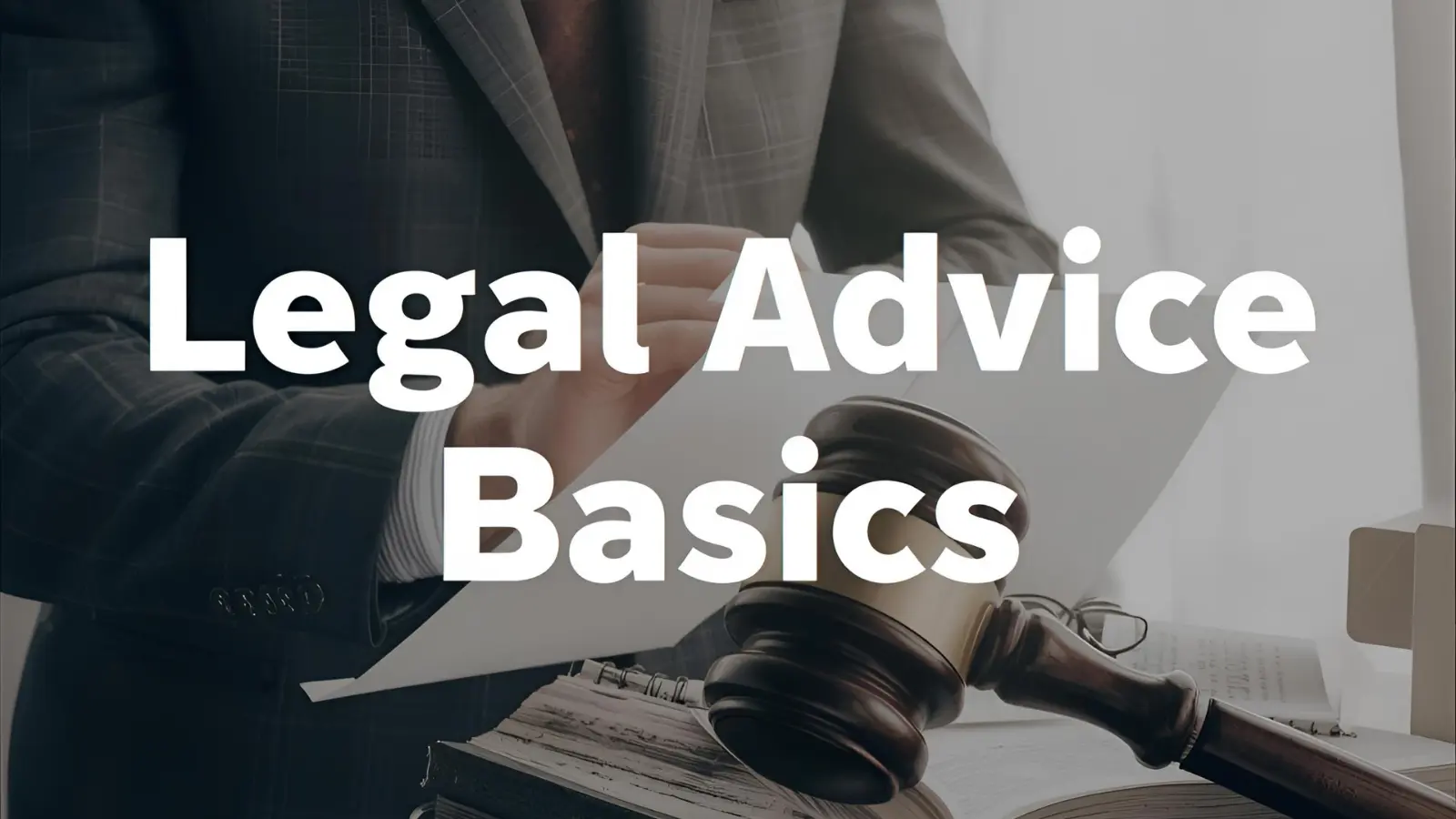In today’s fast-changing world, understanding legal advice basics is no longer a choice — it’s a necessity.
Whether you’re signing a contract, renting an apartment, starting a business, or dealing with an unexpected dispute, having the right legal knowledge helps you make smart, confident decisions.
Many people believe legal advice is only for complicated cases or courtrooms. The truth is, it affects everyday life — from protecting your consumer rights to managing workplace issues or even writing a will.
The law surrounds us in ways we don’t always notice, and the more we understand it, the better we can protect ourselves.
This detailed guide will help you discover what legal advice really means, why it’s important, how to get it, and how to use it wisely.
By the end, you’ll feel more informed, more empowered, and better prepared to handle legal matters with clarity.
⚖️ What Exactly Is Legal Advice?
Legal advice is the personalized guidance given by a qualified lawyer or attorney about a specific situation. It tells you what your rights and options are according to the law.
For example, if you’re unsure about a clause in a business contract, a licensed attorney can explain whether it’s fair or risky — and what steps you should take next.
Legal advice is different from general legal information. Legal information tells you what the law says, while legal advice tells you how the law applies to your case.
🧩 Legal Information vs. Legal Advice
| Aspect | Legal Information | Legal Advice |
|---|---|---|
| Meaning | General explanation of laws | Tailored guidance for your issue |
| Who Provides It | Anyone (non-lawyers too) | Only licensed lawyers |
| Example | “Tenants have legal protection in most states.” | “You can file a claim against your landlord under Section 45.” |
| Legality | Public info | Protected by law and ethics |
✅ Key Point: Always ensure the advice you follow comes from a certified legal professional — not random online posts or unverified sources.
🌟 Why Legal Advice Matters So Much
Legal advice gives you clarity, protection, and confidence when making important decisions. Here’s why it’s essential:
1. Protects Your Rights
Laws exist to safeguard people, but you can only use them if you understand them. A lawyer helps you recognize and defend your rights effectively.
2. Prevents Costly Mistakes
One misunderstood clause in a contract can cost thousands of dollars later. A legal expert ensures you don’t sign anything that could harm you.
3. Simplifies Complex Laws
Legal language can be confusing. Attorneys break it down into simple, clear terms so you can make sense of it all.
4. Saves Time and Reduces Stress
Instead of endless internet searches and confusion, a 30-minute consultation can give you direct, accurate answers.
5. Improves Decision-Making
With professional guidance, you can take smart, lawful steps whether you’re starting a company, buying property, or facing a dispute.
🏢 Common Types of Legal Advice
Every situation is different, so legal advice comes in many forms. Here are the most common ones:
🏠 Family Law Advice
Covers issues like marriage, divorce, custody, and inheritance. A family lawyer can help you navigate emotional situations while protecting your legal interests.
💼 Business and Corporate Law
Business lawyers help with contracts, partnerships, compliance, and employee policies — ensuring your company runs smoothly and legally.
🏡 Real Estate and Property Law
Buying or selling land requires proper documentation and verification. Lawyers help prevent fraud and disputes over ownership or property rights.
⚙️ Employment and Labor Law
If you’ve faced unfair dismissal or workplace discrimination, an employment lawyer can explain your rights and next steps.
🌍 Immigration Law
Immigration attorneys assist with visas, citizenship, asylum, and deportation matters. Their guidance helps prevent paperwork errors and legal issues.
💰 Tax Law
Tax lawyers ensure you file correctly, manage audits, and avoid penalties due to incorrect returns.
⚖️ Criminal Law
Criminal defense lawyers protect your rights if you’re accused of a crime, ensuring fair representation and proper defense.
🧾 How to Get Legal Advice
You don’t always need to spend a fortune to get quality legal help. Here are several reliable ways:
1. Hire a Private Lawyer
For personal or business issues, hiring a lawyer directly gives you in-depth, private, and strategic guidance.
2. Use Legal Aid Services
If you can’t afford a lawyer, many countries offer free or low-cost legal aid through government or non-profit programs.
3. Online Legal Consultation Platforms
Websites and apps now connect users with verified attorneys through chat or video — fast, easy, and often affordable.
4. Community Legal Clinics
Universities and NGOs often host free legal clinics where trained law students and attorneys offer advice to the public.
5. Government Resources
Official legal websites provide accurate legal information and verified lawyer directories to guide you safely.
📚 Real-Life Scenarios Where Legal Advice Helps
Let’s look at some everyday examples of when legal advice can make a major difference:
💼 Starting a Business
A small business owner, for example, might not know about business registration laws or tax obligations. Legal advice prevents future penalties.
🏠 Renting or Buying Property
A lawyer can check for hidden clauses, verify property titles, and ensure you don’t get scammed.
💔 Divorce and Family Matters
When emotions are high, a lawyer ensures fairness and legal clarity — especially in child custody and asset division.
🧑💼 Workplace Issues
Legal experts protect both employees and employers when contracts, salaries, or harassment issues arise.
⚖️ Criminal Accusations
Even minor charges can affect your reputation. Having legal representation ensures fair treatment under the law.
👩⚖️ How to Choose the Right Lawyer
Finding the right legal expert makes all the difference. Here’s how to choose wisely:
- Look for Specialization: Hire someone who handles cases like yours — e.g., a property lawyer for real estate issues.
- Check Experience: Ask about similar cases they’ve managed and outcomes achieved.
- Read Reviews: Online feedback and client testimonials reveal reliability.
- Verify License: Ensure they are registered with a bar council or legal authority.
- Discuss Fees Upfront: Always get a written fee estimate before hiring.
- Evaluate Communication: A good lawyer listens patiently and explains clearly.
📞 What to Expect During a Legal Consultation
Being prepared helps you make the most of your legal meeting:
- Case Discussion – Explain your issue briefly and clearly.
- Document Review – Bring contracts, receipts, or related papers.
- Law Explanation – Your lawyer explains relevant laws and rights.
- Action Plan – You’ll get options and the best strategy forward.
- Next Steps – You can hire the lawyer or follow their written advice.
💡 Free vs. Paid Legal Advice
| Aspect | Free Legal Advice | Paid Legal Advice |
|---|---|---|
| Provider | Legal aid, clinics, online help | Private lawyers or law firms |
| Detail Level | General or basic | Personalized and detailed |
| Speed | Slower | Immediate |
| Reliability | Depends on provider | Professionally accountable |
| When to Use | Minor issues or early guidance | Complex or serious cases |
🧠 Legal Concepts Everyone Should Know
Even without being a lawyer, knowing these core legal principles helps you stay safe and informed:
- Read Every Contract Before Signing – Never sign anything without understanding every clause.
- Ignorance Is Not a Defense – Not knowing the law doesn’t protect you from penalties.
- Rights Come with Responsibilities – Every right must be used ethically and responsibly.
- Keep Written Proof – Emails, receipts, and contracts protect you in disputes.
- Consult Early – The sooner you seek advice, the easier it is to solve a legal issue.
🛡️ Confidentiality in Legal Advice
When you speak to a lawyer, your conversation is protected by attorney-client privilege.
That means your lawyer cannot share your private details without your permission. This rule builds trust, allowing clients to be completely honest and receive accurate advice.
Always choose lawyers who follow strict ethical and confidentiality standards — it ensures your sensitive information remains safe.
🌍 Regional Differences in Legal Advice
Laws differ from one country — even one city — to another.
For example, rental rights in California differ from those in New York or London. That’s why you should always consult a local attorney familiar with the laws in your area.
🗒️ Tip: When searching online, include your region or state (e.g., “legal advice in Texas” or “property law expert in Lahore”) for better results.
💬 Common Myths About Legal Advice
❌ Myth 1: Only Guilty People Need Lawyers
✅ Truth: Everyone has rights. Even innocent people need legal help to protect those rights.
❌ Myth 2: Legal Advice Is Always Expensive
✅ Truth: Many lawyers offer free consultations or sliding-scale fees based on income.
❌ Myth 3: You Can Rely on Online Advice
✅ Truth: Only licensed lawyers can give official legal opinions. Always verify credentials.
❌ Myth 4: All Lawyers Are the Same
✅ Truth: Each lawyer specializes in specific fields. Choose based on your exact issue.
❌ Myth 5: Small Problems Don’t Need Legal Advice
✅ Truth: Early advice prevents small problems from turning into costly legal battles.
🧠 How Technology Is Changing Legal Advice
Modern technology is making legal support faster and more accessible:
- Online Lawyer Portals – Chat instantly with real lawyers.
- AI Tools – Help review contracts or spot risky clauses.
- Virtual Hearings – Attend court sessions remotely.
- Document Automation – Generate legal forms quickly and accurately.
However, always ensure a qualified human expert reviews AI-generated results to confirm legal accuracy.
🧰 How to Prepare Before Seeking Legal Help
Make your consultation effective with these steps:
- Write down key facts about your case.
- Gather all documents (contracts, notices, etc.).
- List your questions beforehand.
- Be honest — lawyers can only help with the full truth.
- Ask for clarity on anything you don’t understand.
Being organized saves time and ensures your lawyer gives accurate, complete advice.
🔑 Key Takeaways on Legal Advice Basics
- Legal advice is personalized guidance from certified professionals.
- Always verify the credentials and expertise of your lawyer.
- Seek advice early — prevention is cheaper than correction.
- Protect your privacy through attorney-client confidentiality.
- Regional laws differ — consult local experts for accurate information.
💭 Real-Life Example
Ali, a young entrepreneur, signed a partnership agreement without consulting a lawyer. Months later, his partner withdrew profits unfairly. When Ali finally sought legal advice, his lawyer found multiple loopholes in the contract that could’ve been fixed earlier.
If Ali had taken legal guidance from the start, he would’ve saved both money and stress. This shows why understanding the basics of legal advice can prevent life-changing mistakes.
🙌 Final Thoughts and Call to Action
Legal advice isn’t just for emergencies — it’s your roadmap for everyday decisions. Whether it’s signing a contract, defending your rights, or planning your estate, the right advice at the right time gives you peace of mind and protection.
Don’t wait until you’re in trouble. Seek professional legal guidance early, ask questions, and learn how the law works for you.
When you understand these Legal Advice Basics, you’re not just avoiding problems — you’re building a future grounded in awareness, fairness, and empowerment.











